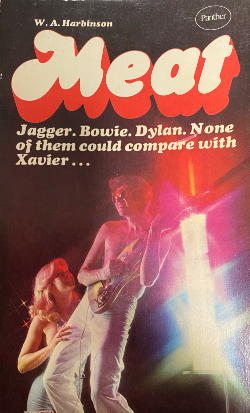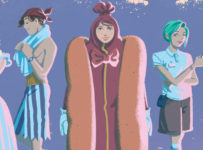
Xavier was dead: to begin with. This exploitation novel by W.A. Harbinson, a man who in the nineties would put out a "non-fiction†book claiming to prove that Nazis are using concentration camp labour to build UFOs in Antarctica, is a curious beast without a centre. Can you exploit someone who was never really there?
A moment of context for Meat: it was found at the equivalent of a Free Little Library, offering the promise of a silly and quick read that would hopefully toe the right side of the exploitation line. It emphatically does not achieve that goal.
This review references systematic sexual abuse, so please avoid reading if that bothers you.
Meat follows the transformation of blue eyed teenager John Smith into the pop superstar Xavier, who can't sing, but nobody cares. Xavier has the it factor, and has been exploited all his life. When he falls in love he becomes suddenly less pliable, but the triumvirate of people running his life — manager Harry, joyless sexpot Baby, and openly evil record label president Degruchy — will run him into the ground.
Meat is bizarre because it looks like a piece of mid-seventies filth, but it is the most literal interpretation of "exploitation†that you can get. No one between these pages is having any fun, and there's nothing to revel in. Xavier is introduced as someone whose animal magnetism saw him get repeatedly sexually abused as a child, inspiring suicidal ideation in his admirers; he jettisons his old life only after his mother commits incest on the day of his father's funeral.
The psychology of Xavier is not credible enough to victim blame him, it's just that nothing makes sense about the way that he is written. He has never wanted anything, and he never wants anything. He makes himself "totally submissive with both man and womanâ€, and the cardboard nature of his character is frustrating. When he meets his love interest, you could reasonably expect him to come alive, but he doesn't. Harbinson introduces the elements you'd expect in a story of rock 'n' roll gone bad, like drug and alcohol abuse, but they serve nothing. Xavier can't be brought low if he never existed.
The only fun part of Meat, and it's a fleeting fun, is the characterisation of Harry's career and approach to music. Harbinson's impression of the recording industry is unsurprisingly cynical, but the approach to what charts and what Harry considers "art†(because he has a charming delusion that makes him believe in what he peddles) is the only legitimately satirical and skewering element of the novel. The rest of the ensemble suffer, as Bunny is mercilessly abused by Degruchy for reasons explicable only as "because he canâ€, with a functionally identical scene interspersed throughout literally ad nauseum.
The only moment that Meat shocks or provokes an emotion beyond disgust and befuddlement is when it loops back to the death scene described in the first chapter, and we see precisely why Bunny screamed. It is lurid and disturbing, a single image that belongs in a book much more enjoyably trashy than the one Harbinson presented.
It is incredibly unlikely that a casual reader would run into a copy of Meat in the street—the Goodreads listing doesn't have a blurb or a cover image—but it should be avoided. The cheerfully goofy cover is a trap. Meat has no moral, but it equally has no titillation to recommend it. It leaves a greasy feeling in the pit of the reader's soul, without having given them any enjoyment along the way.


